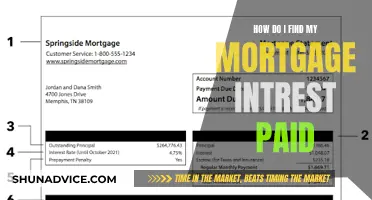
A mortgage maturity date is the date when you are expected to make your final mortgage payment. This date is usually specified in your mortgage agreement and is typically the same length as your loan term. For example, if you take out a 30-year mortgage, your maturity date will be 30 years from the day you took out the loan. It's important to be aware of your mortgage maturity date as it can help you plan your monthly installments and keep home ownership. If you're struggling to meet your monthly payments, you may want to consider extending your mortgage maturity date through options such as loan modification, refinancing, or forbearance. Reverse mortgages mature differently than traditional mortgages and may require repayment through a single balloon payment after a qualifying maturity event.
| Characteristics | Values |
|---|---|
| Definition | A mortgage maturity date is when you’re expected to make your last mortgage payment. |
| Date | The maturity date is usually the same length as the loan’s term and falls on the day of the year that you closed on your loan. |
| Documents | The maturity date will be listed in your mortgage documents. |
| Amortization | The amortization schedule breaks down your monthly mortgage payments, with the maturity date representing the final payment date. |
| Extension | If you’re struggling to meet your monthly payments, you may be able to extend your mortgage maturity date through loan modification, refinancing, or forbearance. |
| Early repayment | Your lender may charge you a fee for early repayment as they will miss out on interest. |
| Reverse mortgages | Reverse mortgages mature differently than traditional mortgages. They require you to repay the loan in a single payment after a qualifying maturity event occurs. |
What You'll Learn

Understanding mortgage maturity dates
The maturity date is usually the same length as your loan's term and falls on the day of the year that you closed on your loan. If you stick to the designated repayment schedule, you should finish paying off your mortgage on your mortgage maturity date. With that, you'll no longer have a mortgage payment as part of your monthly budget. The maturity date on a mortgage is the point in time when your loan term ends, and you're expected to make the final payment.
Mortgage amortization refers to the process of gradually paying off your mortgage through regular monthly payments over the life of the loan. While amortization is the process of repayment, the loan maturity date is the culmination of this process. An amortization schedule breaks down your monthly mortgage payments, where the maturity date represents the final payment date. So, if you took out a 30-year home loan, your amortization schedule will show 360 monthly payments – and the 360th payment will fall on your maturity due date.
Reverse mortgages mature differently than traditional mortgages. They require you to repay the loan in a single payment after a qualifying maturity event occurs. This is considered a balloon payment. As long as you don't trigger a mortgage maturity event, you won't have to pay the loan in full. Once a reverse mortgage reaches maturity, the loan becomes due and payable immediately, and funds will no longer be disbursed.
PPI on Your Mortgage: What You Need to Know
You may want to see also

Reverse mortgages maturing
Reverse mortgages are a popular financial strategy that helps older adults generate more income during retirement. Unlike traditional mortgages, reverse mortgages are not paid in full until they reach maturity, and interest accrues over time. This means that the loan balance grows instead of decreasing.
There is no specific due date for a reverse mortgage to mature. Instead, the loan matures when specific events are triggered, known as maturity events. Common maturity events include the borrower passing away, selling the home, moving out of the home, or transferring the property's title to another person. When a maturity event occurs, the borrower's estate will be notified, and the repayment process will begin. The estate has several options for repaying the loan, including using personal savings, selling the property, or purchasing the home to satisfy the debt. This must be done within six months of receiving the demand letter from the loan servicer.
It is important to note that monthly payments are not required for a reverse mortgage. However, borrowers can choose to pay off the loan early to reduce the interest burden. The reverse mortgage amortization schedule can help borrowers estimate how much will be due once the loan matures, allowing them to prepare their heirs for the future.
Before taking out a reverse mortgage, it is essential to understand the risks and complexities involved. Consult a financial advisor or estate attorney to ensure you make an informed decision.
Is Your Mortgage Assumable? How to Find Out
You may want to see also

What to do if you can't pay
A mortgage maturity date is when you are expected to make your final mortgage payment, provided you've paid according to your original mortgage schedule. This date is specified when you finalize your mortgage loan and is usually the same length as your loan's term.
Now, if you are unable to pay off your mortgage, there are a few steps you can take:
- Contact your lender as soon as possible. They are required to treat you fairly and give you a reasonable chance to make arrangements to pay off the arrears. They will normally write to you within 15 days of a missed payment, but you shouldn't wait for them to reach out. Discuss your options with them and work out a plan for how you will afford the ongoing mortgage costs.
- Seek independent financial advice or get advice from a Citizens Advice Bureau. An experienced debt advisor can help you understand your options and make a plan to manage your debt.
- Check if you have mortgage payment protection insurance. Review the terms and conditions of your policy to see if you're covered in case of unexpected income loss.
- Consult a HUD-approved housing counseling agency or a lawyer if you are facing imminent foreclosure or have been served with legal papers. They can help you understand your options and rights in this situation.
- Consider refinancing your mortgage to extend your mortgage maturity date.
Finding an Old Mortgage Account: Tips and Tricks
You may want to see also

How to extend your mortgage maturity date
The mortgage maturity date is the date when you are expected to make your final mortgage payment, provided you have paid according to your original mortgage schedule. This date is specified in your mortgage documents. If you are unable to pay off your mortgage by the maturity date, there are a few options to extend your mortgage maturity date.
Firstly, you can consider refinancing your mortgage. This involves applying for a new loan with a longer term, which will give you more time to pay off your mortgage. Another option is to renew your loan with your current lender. This may involve providing updated financial information and having the lender underwrite the loan as if it were a new request. If you are unable to renew with your current lender, you can try finding a new loan with a different lender that will allow you to make the lump-sum payment and start a new term.
It is important to note that extending your mortgage maturity date may result in higher interest rates and additional risks. It is always best to talk to your lender about your options as soon as you know you may have difficulty meeting your payments. They may be able to help you find a solution that works for both parties.
Additionally, the standard extension for a maturity date is three months, but this may not be enough time for some borrowers, especially if they are planning to sell the property. In such cases, it may be necessary to request a longer extension or a full reset due to unforeseen circumstances.
Finding the Right Mortgage: A Guide to Home Loans
You may want to see also

How to find your mortgage maturity date
The mortgage maturity date is when you are expected to make your final mortgage payment, provided you've paid according to your original mortgage schedule. This date is usually the same length as your loan's term and falls on the day of the year that you closed on your loan. For example, if you took out a conventional mortgage with a 30-year loan term on January 1, 2020, your mortgage maturity date will be January 1, 2050.
When you finalize your mortgage loan, a mortgage maturity date will be specified in your documents. You will know this date when signing your mortgage. An amortization schedule breaks down your monthly mortgage payments, where the maturity date represents the final payment date.
If you require assistance in meeting your monthly payments, talk to your lender about your options as soon as you can. If you want to extend your mortgage maturity date, you might consider refinancing your mortgage. Mortgage maturity is an excellent time to consider refinancing, especially if mortgage interest rates are much lower than when the mortgage was originally issued.
Mortgage maturity is a simple concept that refers to the date your mortgage loan is scheduled to be paid in full.
Troubleshooting Mortgage Problems: Strategies for Financial Freedom
You may want to see also
Frequently asked questions
A mortgage maturity date is the date when you’re expected to make your last mortgage payment.
You can find your mortgage maturity date in the documents you signed when you took out the loan.
If your mortgage matures with a balance, you have two options: renew with your current lender or find a new loan to pay off the remaining balance.
A reverse mortgage maturity date is when the loan becomes due and payable immediately, and funds will no longer be disbursed.
If you are struggling to meet your monthly payments, you may be able to extend your mortgage maturity date by modifying your loan, refinancing, or seeking forbearance.







